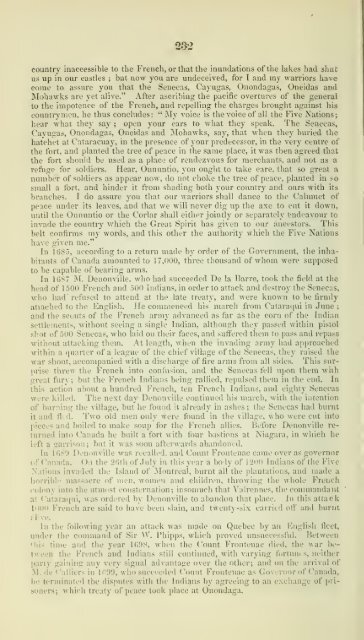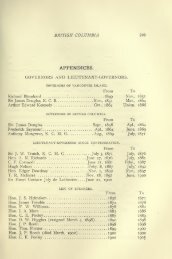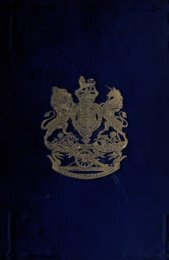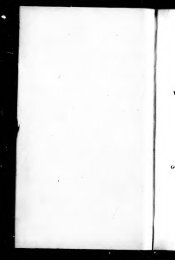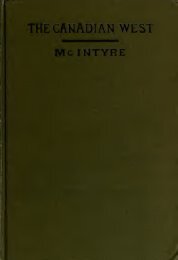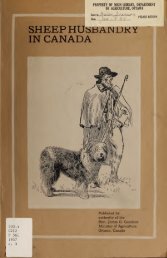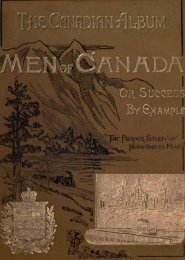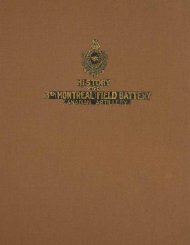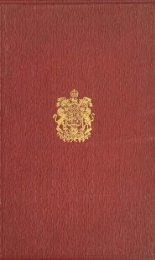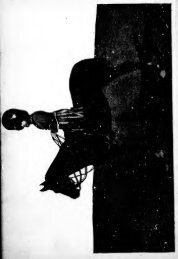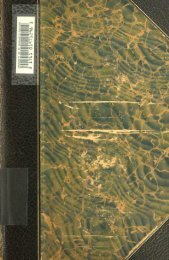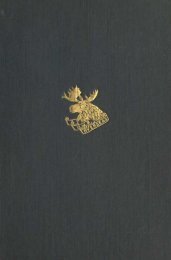Smith's Canadian gazetteer - ElectricCanadian.com
Smith's Canadian gazetteer - ElectricCanadian.com
Smith's Canadian gazetteer - ElectricCanadian.com
Create successful ePaper yourself
Turn your PDF publications into a flip-book with our unique Google optimized e-Paper software.
232<br />
country inaccessible to the French, or that the inundations of the lakes had shnt<br />
us up in our castles ; but now you are undeceived, for I and my warriors have<br />
corae to assure you that the Senecas, Cayugas, Onondagas, Oneidas and<br />
Mohawks are yet alive." After ascribing the pacific overtures of the general<br />
to the impotence of the French, and repelling the chai'ges brought against his<br />
counti'vnien, he thus concludes: " i\Iy voice is the voice of all the Five Nations;<br />
hear what they say ; open yoiu" ears to what they speak. The Senecas,<br />
Cayugas, Onondagas, Oneidas and IMohawks, say, that when they buried the<br />
hatchet at Cataracnay, in the presence of your predecessor, in the very centre of<br />
the fort, and planted the tree of peace in the same place, it was then agreed that<br />
the foi"t should be used as a place of rendezvous for merchants, and not as a<br />
refuge for soldiers. Hear. Onnuntio, you ought to take care, that so great a<br />
number of soldiers as appear now, do not choke the tree of peace, planted in so<br />
small a fort, and hinder it from shading both jour country and ours with its<br />
branches. I do assure you that our warriors shall dance to the Calumet of<br />
peace under its leaves, and that we will never dig up the axe to cut it down,<br />
until the Onnuntio or the Corlar shall either jointly or separately tndeavour to<br />
invade the country M'hich the Great Spirit has given to our luicestors. This<br />
belt confirms my words, and this other the authority which the Five Nations<br />
have given me."<br />
In 168.5, according to a return made by order of the Government, the inhabitants<br />
of Canada amounted to 17,000, three thousand of whom were supposed<br />
to be capable of bearing arms.<br />
In 1687 M. Denonville, who had succeeded De la Barre, took the field at the<br />
head of 1500 French and 500 Indians, in order to attack and destroy the Senecas,<br />
who had' refused to attend at the late treaty, and were known to be firmly<br />
attached to the English. He <strong>com</strong>menced his march from Cataracjui in June ;<br />
and the scouts of the French army advanced as far as the corn of the Indian<br />
settlements, without seeing a single Indian, although they passed within pistol<br />
shot of 500 Senecas, who laid on tlieir faces, and suffered them to pass and repass<br />
without attacking them. At length, when the invading army had approached<br />
within a quarter of a league of the chief village of the Senecas, they raised the<br />
war shout, ac<strong>com</strong>panied with a discharge of fire arms from all sides. This surprise<br />
threw the French into confusion, and the Senecas fell upon them wiih<br />
great fury; but the French Indians being rallied, repulsed them in the end. In<br />
this action about a hundred French, ten French Indians, and eighty Senecas<br />
were killed. The next day Denonville continued his march, with the intention<br />
of burning the village, but he found it already in ashes ; the Senecas had burnt<br />
it and fled. Two old men only were found in the village, who were cut into<br />
pieces and boiled to make soup for the French allies. Before Denonville returned<br />
into Canada he built a fort with four bastions at Niagara, in which he<br />
left a garrison; but it was soon afterwards abandoned.<br />
In 1689 Denonville was recalled, and Count Frontenac came over as goverm^r<br />
of Canada. On the 2(Jth of July in this year a body of 1200 Indians of the Five<br />
Nations invaded the Island of Montreal, burnt all the plantations, and made a<br />
horrible massacre of men. women and children, throwing the whole French<br />
colony into the utmost consternation; insomuch that Valrennes, the counnandant<br />
at Cataraqui, was ordered by Denonville to abandon that place. In this attack<br />
1000 French are said to have been slain, and twenty-six carried off and burnt<br />
alive.<br />
In the following year an attack was made on Quebec by an English fleet,<br />
under the <strong>com</strong>mand of Sir W. Fliipps, which proved unsuccessful. Between<br />
this time and the year 1098, when the Count Frontenac died, the war between<br />
the French and Indians still continued, with varying fortunis, neither<br />
party gaining any very signal advantage over the other; and on the ari-lval of<br />
M. de Calliers in irO'J, wlio succeeded (\)nnt Frontenac as Governor of Canada,<br />
he terminated the disputes with the Indians by agreeing to an exchange of piisoners;<br />
which treaty of peace took place at Onondaga.


